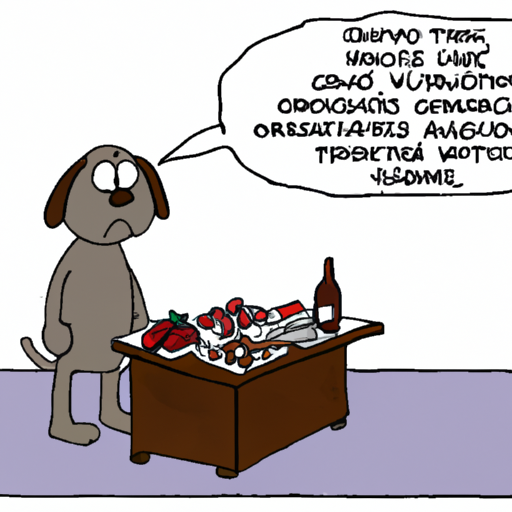As a loving caregiver, you want the best for your beloved furry friend. That includes the food they eat. But sometimes, it can be hard to determine what items are safe for your dog to consume and which ones are not. This guide is intended to help you navigate the complex world of canine diet.
1. Chocolate and Caffeine
Chocolate and caffeine are among the most dangerous substances for dogs to ingest. They contain theobromine and caffeine, compounds that are toxic for dogs.
- Dark chocolate and baking chocolate are particularly dangerous because they contain higher levels of theobromine.
- Symptoms of chocolate or caffeine poisoning in dogs include restlessness, rapid breathing, muscle tremors, and seizures.
| Chocolate Type | Theobromine per Ounce |
|---|---|
| White Chocolate | 0.25 mg |
| Milk Chocolate | 58 mg |
| Dark Chocolate | 130 mg |
| Baking Chocolate | 393 mg |
2. Grapes and Raisins
Even a small amount of grapes or raisins can cause your dog to become seriously ill.
- The exact reason for their toxicity to dogs is unknown, but ingestion can lead to acute kidney failure.
- Symptoms include vomiting, diarrhea, abdominal pain, and lethargy.
3. Onions, Garlic, and Other Alliums
Onions, garlic, and other members of the allium family are dangerous for dogs to consume.
- They contain compounds that can cause damage to a dog’s red blood cells, leading to anemia.
- Ingestion of these foods can lead to weakness, pale gums, elevated heart rate, and collapse.
4. Alcohol
Alcohol and foods containing alcohol can cause serious problems for dogs.
- Alcohol can lead to vomiting, diarrhea, decreased coordination, central nervous system depression, difficulty breathing, and even death.
- The smaller the dog, the greater the effect.
5. Xylitol
Xylitol, a sweetener found in many sugar-free products, is highly toxic to dogs.
- Even small amounts can cause a sudden drop in blood sugar, leading to loss of coordination and seizures.
- In large amounts, xylitol can lead to liver failure.
Frequently Asked Questions
Q: Can dogs eat cheese or other dairy products?
While some dogs can eat cheese without any problems, others may be lactose intolerant and experience gastrointestinal upset. In general, it’s best to avoid giving your dog large amounts of cheese or other dairy products.
Q: What about bones?
Some bones, particularly cooked bones, can splinter and cause blockages or tears in the digestive tract. Raw bones are generally safer, but they can still carry risks, such as bacterial contamination.
Q: Can my dog eat a small amount of chocolate?
Even small amounts of chocolate can be harmful to dogs, especially dark and baking chocolate. If your dog ingests chocolate, contact your vet immediately.
Remember, when it comes to your dog’s health, it’s always better to err on the side of caution. When in doubt, consult with your vet before introducing new foods into your dog’s diet.



